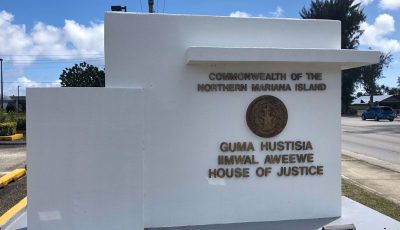ON FINDING HE BREACHED CONTRACT OVER DENTAL WORK
Former judge argues appeal before CNMI Supreme Court

Lizama
Former Superior Court Associate Judge Juan T. Lizama appeared yesterday before the CNMI Supreme Court to argue his appeal on Associate Judge Joseph N. Camacho’s decision finding him to have breached a contract by failing to pay for dental work he ordered performed on his brother in 2012.
Attorney Michael A. White, counsel for Dr. Alan Stuart Markoff who owns Toothworks, argued the dentist’s opposition to Lizama’s appeal.
After listening to the counsels’ arguments, CNMI Supreme Court Associate Justice John A. Manglona and Justices Pro Tem Robert J. Torres Jr. and Michael J. Bordallo placed the matter under advisement.
Lizama presented three issues on appeal: whether Camacho erred by finding an enforceable contract; whether the failure to join an alleged necessary and indispensable party to the suit deprived the trial court of jurisdiction; and whether the statute of frauds is applicable when an individual contracts with another for services that benefit a third party.
Markoff sued Lizama for allegedly failing to pay for his brother’s dental services. The dentist claimed that Lisama owes him and the clinic $5,381. He alleged that the former judge refused to make payments beyond a single $1,000 payment.
In his May 28, 2015 decision after a bench trial, Camacho found Lizama liable to pay Markoff $5,381 on the principal plus $1,123.82 in pre-judgment interest or for a total award of $6,504.82.
Camacho ruled that there was a valid contract between the parties regarding dental work on Lizama’s brother, Antonio.
Camacho said Lizama failed to make the required payments for Antonio’s dental work.
Camacho said Lizama promised to pay for Antonio’s dental care, that the dental work was performed, and that Lizama failed to make full payments, thus breaching the agreement that he made with Markoff.
Camacho found that Lizama’s testimony lacks credibility, especially because of Lizama’s “circular and evasive answers to questions” while on the witness stand.
Lizama appealed, asking the CNMI Supreme Court to reverse Camacho’s ruling.
At yesterday’s hearing on the appeal, Lizama, who is representing himself, said this case is about “he said” (Markoff) and “he said” (Lizama).
Lizama argued that his alleged promise to pay for his brother’s dental services is unenforceable because it is based on an agreement that lacks consideration for Markoff.
Lizama said the trial court’s finding that he made a promise to pay for all of his brother’s dental services is clearly erroneous.
Lizama said it’s a culture thing in the CNMI, in which a family is helping a family member.
Manglona pointed out that the trial court finds Lizama’s testimony not credible.
Torres said it’s not the high court’s job to weigh the evidence.
Lizama said there’s conflicting evidence in this case.
Bordallo noted that the “he said” and “he said” is not for the high court.
Lizama said there is no memorandum or written agreement on what dental services to perform.
Manglona then asked why Lizama paid $1,000 if there’s no agreement.
Lizama stated among other things, that he got tired of calls from the clinic about billings so he decided to make courtesy.
“I should not be penalized for helping my brother. I should be commended for paying,” Lizama said, adding that there is a public policy involved here.
In his pleadings, Lizama said as to the issue of enforceability of contract for lack of consideration, the case involves a mixture of question of law and facts.
Lizama said the issue of whether Camacho erred in his finding of facts that there was a promise by him that was bargained for is reviewable under the clearly erroneous standard.
Lizama said Camacho’s finding that he made a promise to pay for all of his brother’s dental services is clearly erroneous.
He said the trial had no jurisdiction over this case because Markoff failed to join Antonio, a necessary and indispensable party.
White said it is clear that Lizama made a promise to pay for his brother’s prospective dental care, and that this promise was enforceable.
White said the statute of frauds is inapplicable to the facts of this case.
White said in any event, Lizama waived both the failure to join and the statute of frauds defenses because he failed to raise either in his answer to the complaint of in any other manner before the Superior Court.
The Supreme Court, he said, cannot consider this issue when raised for the first time on appeal.
White said Camacho’s judgment should be affirmed.
White said Camacho found that there was a promise to pay.
White said he submits that there’s more than ample evidence to support the trial court’s findings.



























